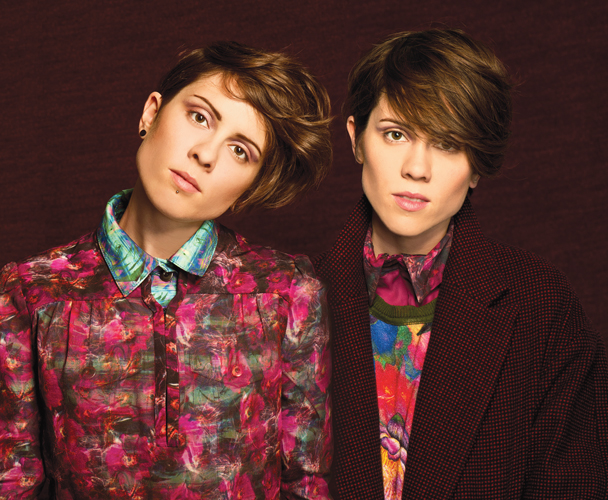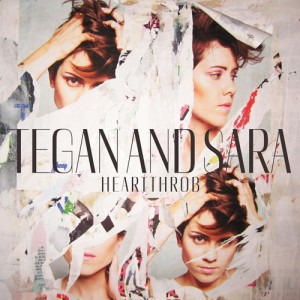

An interview with Sara Quin of Tegan and Sara.
by Gregg Shapiro
Photo by Lindsey Byrnes
Tegan and Sara, the duo consisting of openly gay Canadian twin sisters Tegan and Sara Quin and their band, have been evolving from singer/songwriter acoustic arrangements to fuller sounds with additional instruments—particularly those of an electronic nature. Their latest disc, Heartthrob (WB/Vapor), is the culmination of those efforts. Heartthrob pulses with a set of irresistible songs, incorporating trademarks of their style such as infectious melodies, vocal interplay and harmonies, and a distinctive use of lyric repetition. The songs “Closer” and “Drove Me Wild” are full-fledged club anthems, placing Tegan and Sara firmly in dance diva territory. I had the pleasure of speaking with Sara shortly after this new disc’s release.
Gregg Shapiro: Sara, keeping in mind the heartbreak and heartache themes we hear on Heartthrob, where do you stand on the subject of Valentine’s Day?
Sara Quin: It’s funny, because I think we’re fairly romantic and sentimental in terms of our personal lives and who we are. But I’ve always had a very strange feeling about Valentine’s Day. I feel like it’s one of those special occasions that I am always reflexively doing the opposite of what you’re probably supposed to do. Instead of “a romantic date out on the town with my gal,” I generally end up in some kind of group—maybe a bunch of different friends—hanging out. Last year, I spent it at the dog show at Madison Square Garden with my girlfriend. We were there with a dozen other people, heckling dogs from the nosebleeds. I tend to celebrate the day by not doing it like a Hallmark commercial. [Laughs]
More than a dozen years after your major-label debut, what would you say are the most significant elements in the evolution of Tegan and Sara as individuals and as a duo?
It’s a tough thing, because we’ve changed so dramatically as people. What’s sort of remarkable about that transformation is that it hasn’t meant the end of the band. We’ve changed as people, and our sound and look have changed [as well as] our approach to the industry, our goals, and our expectations. But I’m just grateful that all of that hasn’t meant that the band had to be finished.
In a way, I’m also glad that the band didn’t get caught in a state of arrested development. I’m glad that we were able to grow outside and inside of the project and that it’s still something people are interested in. I think we’re genuinely humbled and excited that people are still interested after all this time. I think it’s fairly common that people run a series of albums, and then there’s sort of a natural end to it. Thankfully, we haven’t arrived there yet. It’s positive for us, both personally and professionally.
 Because collaboration is such an integral part of being in a duo, do you and Tegan have to do anything special when you bring in another party, such as producer and songwriter Greg Kurstin?
Because collaboration is such an integral part of being in a duo, do you and Tegan have to do anything special when you bring in another party, such as producer and songwriter Greg Kurstin?
In a way, we weren’t great at collaborating when we were younger. We did a lot of our songwriting independent of one another. The project was built on some of the friction and complexities that come from two people who are very strong-willed and have their own identities and their own ideas about how music should sound or how the band should be. It’s through collaborating with other people—different producers or songwriters, side projects, and even within the touring band—it’s that experience that has made Tegan and me more effective at collaborating with one another. It’s funny—it’s almost like the skills that we’ve built with other people have made our own skill set within the band stronger. We still approach it with a bit of hesitation. I think we recognize that maintaining some of the autonomy in our songwriting, and then having to come together creatively and almost mathematically compromise and create some kind of consistency or cohesion with our songs, is what makes that special cocktail. It’s not Tegan’s vision, it’s not my vision, it’s really the combination.
One of the things that Greg Kurstin does is enhance your trademark sound with synthesizers and glossier production. Do you think it was inevitable that Tegan and Sara would make a record such as this one that incorporates electronic beats and those kinds of influences?
I think so. I definitely don’t think we were heading towards a metal record. [Laughs] I don’t mean that in a put-down kind of way. If we were heading towards a metal record, that would be great, too. But I think the spectrum of influences and the emphasis on certain elements that we’ve been pulling from in our career have changed. When we first started out, we still cited people like Madonna, Cyndi Lauper, Bruce Springsteen, and Talking Heads—a million bands. We loved music. I grew up listening to Patsy Cline. Old country to hip-hop to electronic—we weren’t discriminating against anything, but we naturally gravitated towards a stripped-down singer/songwriter type of thing for the first couple of records. Each record has been pulling out and emphasizing [different influences] with the music that we make. Synthesizers, keyboards, programming, electronic elements—we’ve sort of flirted with all of them on our records, to varying degrees. People who aren’t as familiar with the band might be surprised about what they remember about us. But I think for people who’ve been following along, this isn’t a complete departure. It’s just another step in the evolution.
The music video for “Closer” features you and Tegan acting out singing karaoke to the song. Have you ever encountered someone performing a karaoke version of a Tegan and Sara song?
[Laughs] Sometimes I feel like that could be the description of what I’m doing with some of my own music! [Laughs] I’ve never been in a bar and seen anyone karaoke one of our songs, but we always check out fan videos and people doing versions of our music. I think it’s incredibly flattering. I love karaoke, I love singing other people’s music. I think it’s a really wonderful tradition of infusing your style and your ideas on somebody else’s music. The day that we go to a karaoke bar and they have a Tegan and Sara song on the playlist, I’ll be thrilled—really excited.
The “Closer” video features a variety of couples, including a few same-sex pairs. How important is it for you to be inclusive in that format?
This is the first time that we purposely included a narrative involving other people and characters. Most of our videos are sort of abstract and we just focus on me and Tegan. There’s generally not much of a story involved. It’s just not the way that we’ve expressed ourselves visually. But with this video, we knew that we were going to rely a little bit more on a narrative, and when it became clear that there was going to be couples involved, it was the most important thing for us [to have] same-sex couples represented. I think we walk a fine line in our band where we are completely proud and comfortable and open about our sexuality. But we’re also very cognizant of the fact that we still live in a world where if things are not portrayed properly or in a respectful way, they can suddenly take a crazy left turn. I would never want people to think that we’re exploiting anyone, straight or gay. I want to honor what I think is a really diverse fan base. Tegan and I have seen our band develop during some really important years in our society where being gay and being in a band doesn’t necessarily mean you are a gay band. It also doesn’t necessarily mean that you’re only going to have a gay audience. Those kinds of limitations and reductions angered and frustrated me, made me furious, because I wanted to be gay and be a band that could be liked by everybody. This was one of our first opportunities to make something that reflected the song and the energy and the spirit [that was also] inclusive of same-sex couples.
I think the most heart-wrenching song on the disc is “Now I’m All Messed Up,” which contains the emotionally weighted line “Now I’m all messed up sick inside wondering where/Where you’re leaving your make-up.” What can you tell me about that song?
It’s interesting—that was the first line that I wrote for the song. It was something I had scribbled down. It is a really intense and emotional song, and it started from that one lyric. I wasn’t going through a breakup or a trauma, or anything like that. I had started to date someone really significant in my life, and it was starting to get serious. As I was starting to write music for this record, I was thinking about the breakups that I had in the past and how traumatized I was by them. When you start to fall in love with someone, even when you’re happy, that can be the scariest time for introspection and writing. At least that’s my experience. When you’re deep in the shit and you’re sad and you think there’s nothing worse that can happen, there’s nothing to lose. All you’re doing is reflecting. [So even though I was] very happy and feeling like I was in a good place and I was falling in love with someone, I was utterly paralyzed by the idea that I could go through a breakup or that someone could cheat on me or leave me. I had this idea of that line in my head. My girlfriend wears makeup—she wears mascara. I would wake up and there would be mascara on my pillowcases. I thought this would be the worst thing in the world, the idea that she would be with someone else, leaving her makeup in their bedroom. It’s maybe the first time I was writing that type of song completely projecting. It hadn’t happened; I was worried that it would happen. [Laughs]
Jack Antonoff, who co-wrote the song “How Come You Don’t Want Me?” with you and Tegan, had a good night at the Grammy Awards in February with his band fun., as did your fall 2012 tour-mates The Black Keys. What would it mean for you and Tegan to get some love from Grammy voters?
[Laughs] I was delighted to see both fun. and The Black Keys getting so much love at the Grammys. It’s really cool. Jack’s such a sweet guy. It’s a weird thing to say somebody deserves something, because there’s lots of bands, obviously, that will never be recognized by the Grammys. I think there are so many people who are ridiculously talented and gracious and wonderful. We shouldn’t judge our lives or our careers by the accolades or awards that we win. I think that’s a dangerous thing to do. It still is really amazing to see somebody as wonderful and sweet and giving as Jack do so well with his band. I was really happy. Saying that, I think getting nominated for a Grammy is a remarkable thing. Recognition from your peers and your industry feels good when you’ve worked really hard. It feels like a significant thing. I’ve never really subscribed to the idea that anyone can judge somebody’s art against somebody else’s. I struggle with the idea that one thing should be a winner over another. But there’s a part of me—artistically and as an ambitious person—that feels recognition on that level would be significant [laughs] and something very important to me.
Tegan and Sara perform at Warehouse Live, 813 St. Emanuel St., on March 15. Tickets: warehouselive.frontgate.com or 888/512-SHOW.
Gregg Shapiro also writes the GrooveOut column in this issue of OutSmart.










